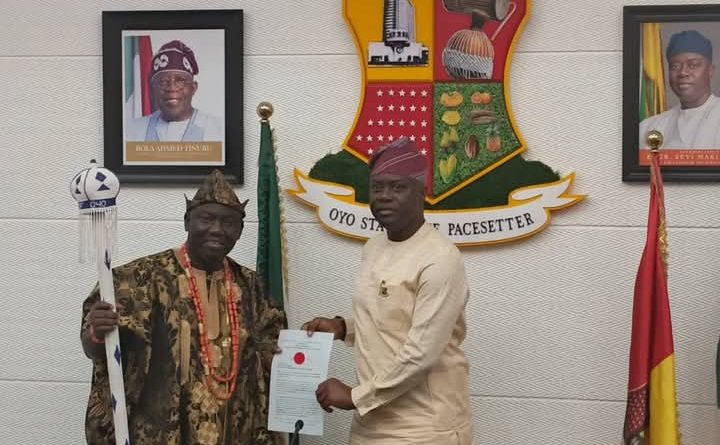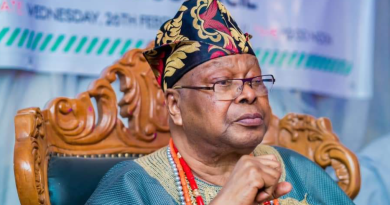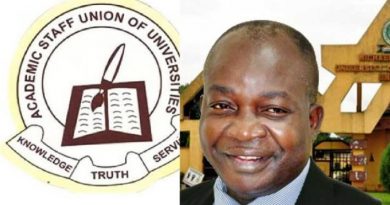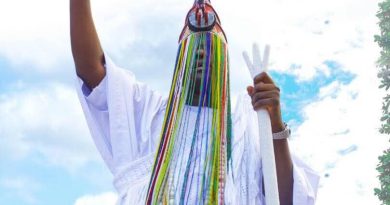Alaafin’s Enthronement: The Tales Of Two Oracles And Olu’awo Of Oyo State! By Lanre Ogundipe
Oyo State’s sobriquet was not acquired without historical evidence or background. The word – pacesetter – became a watchword as a result of the dint of unceasing work to distinguish itself among the states in Nigeria. Ajise bi Oyo ni anri, Oyo o nse bi baba eni kookan literally translates thus, Oyo is unique and it’s the cynosure of other eyes to behold in all its strifes for the best. It’s not a copycat of any in whatever it does to justify its existence. This goes confirms its originality and the spermacy of its leadership qualities in all the spheres of human endeavour. This position had, for centuries, propelled many of her wards to distinguish themselves in their chosen careers, flying in beautiful colours. Even the contentious issue of the enthronement of the new Alaafin would, in the end, prove to be one. Till date, the records of the old Oyo Empire remain unparalleled and indelible in the anals of history anywhere in the continent of Africa and the black race in general.
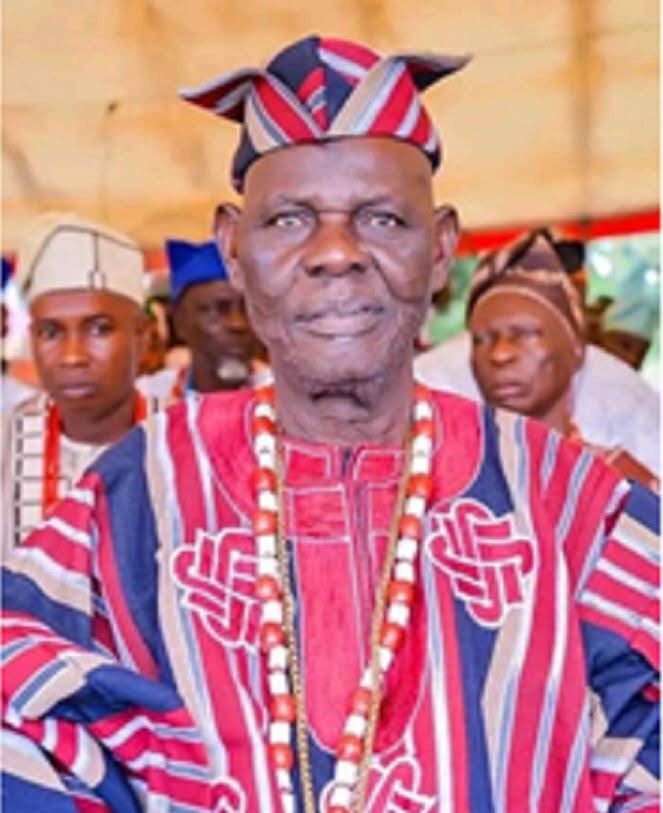
This importance of historical facts made it practically impregnable for any tinkering or distortion of facts, no matter how minute it looks. History and the age-long customs of Oyo and its traditions cannot be invalidated and survive the test of time!
Let me state from the onset that history is not what anyone can toy with as it affects the foundation of the soul of our society and personal lives. So we should be extremely careful not to play with the lives of people when narrating history whether oral or documented. It’s emotional as well as sentimental.
When historical facts pertaining to the royal stool anywhere are being discussed anywhere, passion and emotions are involved. Alaafin’s stool is not an exception. The Oyos are are ready to protect their history no matter what it takes or cost, moreso when that’s the only palace where archival materials, documents and other artifacts can be accessed in record time. Because of the efforts of their forefathers, documentation of its past, either favourable or otherwise, are well preserved till date. Those who are students of history and historians would attest to this fact that – only in Oyo, Benin and Otu ife palaces can such historic landmarks be found without stress. Therefore, writing on such an important issue goes along with the depth and affinities of the writer to the culture, the customs and traditions of the entire life of the people who are the custodians of this heritage. Hence, this write up is to draw our attention to the uniqueness of Oyo traditions as regards ascendancy to the throne. To broach the matter, I need to appeal to the conscience of every Youba person and speak truth to power and by extension to the cross sections of the divide, particularly to those directly in the selection and appointment of the new royal head to the office of the Alaafin of Oyo.
From the old Oyo Kingdom to the present day Oyo, the sobriquet – Ajise bi Oyo – the pacesetter has been strictly adhered to. It’s not just an appellation or nickname picked by the roadside, it was earned based on its consistency and interventions on intricate matters that showcase its sense of justice without fear or favour. The duty to dispense justice and shield its cultural values from interlopers had been the bedrock of its political administration of the empire, which was bequeathed by the progenitors. The late Alaafin, Oba Lamidi Olayiwola Adeyemi, told anyone who cared to listen to defend the throne of his forefathers. He made no pretence that he would never be caught in the web of trading away his heritage for filthy political lucre or pencunary gains. He was thus able to make Oyo, and Otu Ife stand out – as the source and foundation of Yoruba existence among other races and ethnic nationalities in Nigeria and the black race throughout the world. There are verifiable historic landmarks from Oyo Ajaka, Oyo Ile and present day Oyo Alaafin that attest to this.
Let’s not pollute the water that breathe life into our world; let’s also refrain from contaminating the source bequeathed on us by our forebears. The issue must be amicably resolved.
That’s where the Ijoko-Agba, the Elders Council Forum of the Old Oyo Kingdom derived its native intelligence to pontificate when knotty issues that seemed rancorous or cancerous to the well-being of the land rear their head to tear down and put asunder its unity. The Elders would quickly rise and come together in unison to echo the usual refrain – mo to ‘se, lo ni Oyo, Onibode loni Aafin, which means only the knowledgibles can rightly decipher what’s in the offing, and without colouration or twist straighten the curves and navigate the troubled path. In specific, what were they referring to? The reference is to IFA, which when consulted resolves all the knotty issues and the ranging bubles are deflated. That is when you hear them saying oro ti lo sodo re mumi – that means the matter had gone to stream to wet the parched throat. And this was the reason behind the empanelling of the seven elders that constitute the warrant chiefs known as the Kingmakers in the ancient city. Going by this Yoruba mythology or etymology, the figure 7 represents “perfection.”
The Oyo Mesi were the seven principal councilors of the Kingdom. They constituted the ‘Wisemen’ Electoral Council and possessed legislative powers. Led by the Bashorun, acting as the prime minister, and consisting of the Agbaakin, the Samu, the Alapini, the Laguna, the Akiniku, and the Ashipa, they represented the voice of the Yoruba nation (till date) and had the chief responsibility of protecting the interests of the empire. Each chief has a state duty to perform at the royal court every morning and afternoon. Each also has a deputy who they would send to the Alaafin if their absence is unavoidable. The Oyo Mesi developed as a check on the Alaafin’s power, preventing the Alaafin from being an autocrat; they have compelled many Alaafins to commit suicide during the 17th and 18th centuries.
The head of the council of Oyo Mesi, the Basorun, consulted the Ifa oracle before the royal succession for approval from the gods. New Alaafins of Oyo were therefore seen as being appointed by the gods. They were regarded as Alase ekeji Orisa, meaning “deputy of the gods.” The Basorun had the final say on the nomination of the new Alaafin after consultation with the Ifa oracle that must have spoken expressly, his power rivaling that of the king himself. For example, the Basorun orchestrated many religious festivals; he did this in addition to being commander-in-chief of the Oyo army, which gave him considerable independent religious authority.
From the foregoing, the Kingmakers viewed government’s intervention as a clear breach of protocol which cannot be but pure usurpation of their roles and it must be resisted. But it is also clear that the kingmakers equally tampered with the same protocol bringing in non cabinet members to cast lot during the exercise which also signaled a violation of the selection procedures. Attention was drawn to redress and the kingmakers who refused, insisting that the choice was already made. Can we be honest that with the involvement of non cabinet member in the selection, the process is deemed nullified? The oracle’s voice is deemed to have been stiffled in the process. The Christians will tell you that if errors were not found in the Old Testament, the advent of a new would have been nugatory.
The kingmakers paved the way for the government’s intervention and when the latter called for a revisit, it was outrightly rebuffed. This necessitated the government calling for Ifa to speak on the issue since we all agreed that Ifá kìí parọ́, ọ̀pẹ̀lẹ̀ kìí ṣèké -Ifá never lies nor speak falsely, divination chain is never wrong. Another world renowned Ifa priest in person of Professor Wande Abimbola, whose family has a record of being the priest to the Palace for centuries, was consulted to divine on the 82 princes who had shown interest. Wande Abimbola, who had been known for his apolitical stand over the years, a man of proven integrity, did as he was charged and came up with a Prince picked by Ifa. But rumblings still persist in Oyo-Mesi cabinet. This shows to the larger public that the kingmakers have something unusual in their luggage. In Yoruba, won ti ko ebo mo eru – their luggage contains contraband.
No cultured Yoruba or traditionalist would come out to say Ifa nparo, both sides consulted “Ifa” that produced two different names as qualified for the throne. In the council of Ifa priests, when issue gets to this standpoint, the next person in turn is the topmost head of the cult- OLUAWO. He would be beckoned to unravel the mystery. Either of the earlier priests must have missed the “iki”, the chants to show and display that truly -Ifá kìí parọ́, ọ̀pẹ̀lẹ̀ kìí ṣèké – Ifá never speak falsely, divination chain never wrong. One of the two Ifa priests must have inadvertently omitted a verse or some lines which led to the wrong choice. When issues become confusing, the head priest called Oluawo steps in to unravel the mystery and resolve the conflict. So the kingmakers should stop dragging this matter any further. There’s this saying in Yoruba too – e te awo, o ni eerin ogberi – which translates to, the disgrace or disappointment of the cults is a mockery amongst non-cult members. If we value our culture as claimed in Yorubaland, enough should be enough. We can’t continue to pollute the space with the uncouth presentation that is part of our core values.
The riddles to be resolved here is – the tales of two Ifa oracles – and, going by the Yoruba etymology or entomology, the Oluawo has stepped in to resolve the impasse. The new Oluawo now is – Governor Ifa-Seyi Ifa-Makinde. The stalemate is over with the government’s pronouncement backing the outcome of Ifa consultation by the renowned priest. That is not to say the Kingmakers did not consult with Ifa oracle. What stood out in this are the credentials and credibility of Professor Wande Abimbola laced with the pedigree of his family background as an Ifa priest in the royal court of Aafin Oyo, which is not in doubt.
The kingmakers on the other hand will need to convince the Oyo people and the race of the superiority of their Ifa priest over the versed and knowledgeable Awise Agbaaye, Wande Abimbola’s over 44 years experience in that office.
I plead reverently with our elders to bring to bear their wealth of experience to ensure that the Oluawo’s verdict is honoured. Professor Wande Abimbola’s intervention as an Oyo indigene should be enough to douse the tension. Yoruba Unity Forum, Yoruba Council of Elders and others should not siddon look; they should be proactive to stem the tide and allow peace to reign in Yorubaland.
It would be recalled that the ascendancy of late Oba Olayiwola Adeyemi was delayed with a protracted legal battle before the Oba finally ascended the throne in 1970 shortly after the end of Nigeria civil war. This was during the military era under the late Robert Adeyinka Adebayo of the old Western State.
A truce is required to sooth frayed nerves and come together as brethren to chart the path of peace. Therefore , Ijoko Agba Ile Yoruba is expedient and it should be conveyed without delay. It the duty of every Yoruba to see to how best this matter should be nipped in bud. Counter accusations will lead us nowhere. Further polarisation will create many more that complicate issues.
Lets all say Kabiesi to new Omoye, Oba- elect, Akeem Owoade as the 38th Alaafin of Oyo
Ile Yoruba o ni baje oo.
©️ Lanre Ogundipe
Public Affairs Analyst:
Former President Nigeria and African Union of Journalists
January 14, 2025

